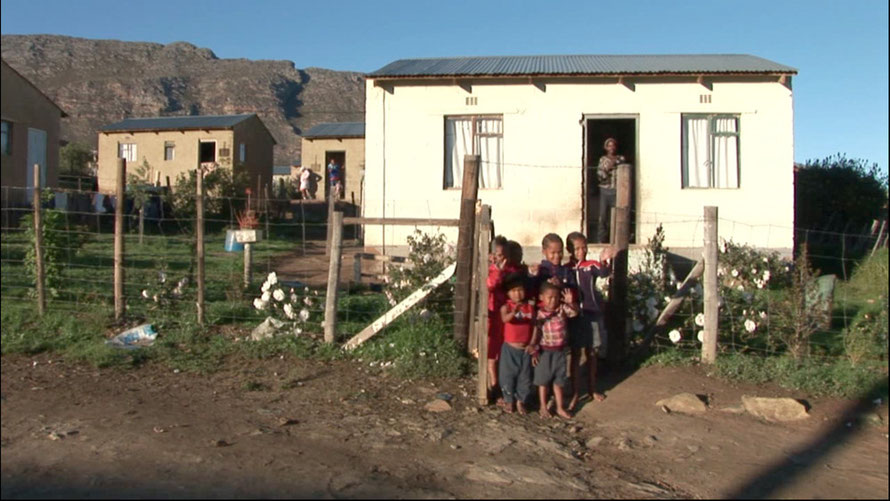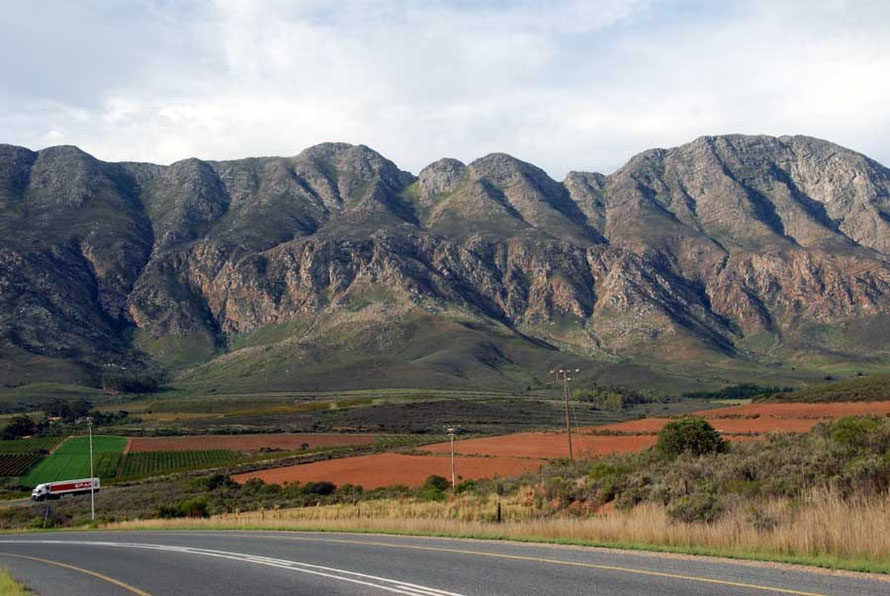Wineland IV: Labour Conditions in the Fruit and Wine Industry in the Western Cape

The wine industry in the Western Cape began with the growing of grapes to ward of scurvy for the crews of spice ships from the Indies in the 17th century. The arrival of Huguenot exiles from France gave a boost to the industry and under British rule the Cape became a major supplier of wines to the UK. In 1859 nearly a million gallons of South African wine was exported to the UK. The ending of preferential tariffs and the ravages of Philoxera aphid had a devastating impact on the wine trade. This gradually recovered until massive over-production for a limited domestic market occured.

In 1918 the South African governemnt sponsored the formation of the Koöperatieve Wijnbouwers Vereniging van Zuid-Afrika Bpkt (KWV). This putative cooperative soon rose to dominate the entire wine industry and set prices, production quotas and policies. Under the Apartheid regime the wine industry stagnated and up to 70% of grapes grown were either used for fortified wines, brandy, table grapes or thrown away. The ending of Apartheid has seen a reversal in this trend and a growing awareness of modern fermentation techniques. Unfortunately, this has not been matched by progress in the social and economic conditions of the vineyard and fruit orchard labour force. Indeed, the removal of state support post-apartheid has led to the growing indebtedness of many farms and the increasing casualisation of farm labour.
in 2011 Human Rights Watch, a US-based NGO, published a damning report on the working conditions of Black and Coloured workers in the wine and fruit industries in the Western Cape.
I have extracted some of the report's findings here. This is then followed by a summary of its finding extraced fron a Guardian article below.
Ripe with Abuse: Human Rights Conditions in South Africa's Fruit and Wine Industries
603,000 people are employed in agriculture in South Africa. Agriculture is country's 'most labour intensive export sector.' In 2009 the export value of wine from the Western Cape was 5.91 billion rand ($700 million) p.25.
Alongside these 630,000 workers 'an estimated 3 to 4 million farm dwellers live on farms in South Africa' p.35.
Farm dwellers may or may not work on the farm. Non-working farm dwellers are often family members of farmworkers, pensioners who used to work on the farm, or former farmworkers who no longer work on the farm for a variety of reasons p.35-.
[This suggests that for every agricultural farmworker in South Africa there is an average of 4 - 5 farm dwellers dependent on that farmworker for their right to stay in their home and in part for the livelihood. ]
Satellite photo showing Nkqubela township's location on bone dry, infertile ground on the periphery of Robertson with the fertile, irrigated land of the Breede River valley so close and yet so far
There are 121,000 agricultural workers in Western Cape - 50% of whom are full-time, mainly male, workers. p.27 Seasonal workers are women living on farms, migrants from other parts of South Africa and foreign migrants from particularly Zimbabwe and Lesotho.
Western Cape farm size averages 1000 hectares with between 4 - 70 permanent workers with some taking on as many as 1,000 seasonal workers p.26.
'The difference in wages for farmworkers versus other workers is drastic: in 2010 the median pay for farmworkers was R1,213 (£87) per month, compared to R3,683 (£264) per month for workers in the formal sector. Female farmworkers are paid even less than male farmworkers with respective median incomes of R1,192 (£85.50) per month versus R1,300 (£93.24) per month.' p.27
'Domestic violence is prevalent on farms; as one lawyer said, the problem of domestic violence on farms “is enormous, huge, it’s huge.”'p.29
The HRW report is not the first to look at the conditions of farmworkers in the Western Cape or South Africa. And initiatives are being taken to improve conditions.
The report concludes, 'It is not clear, however, what impact newer initiatives might have on conditions faced by farmworkers and farm dwellers, given the persistent problems they have continued to confront even after intense scrutiny and promised reforms' p.3.
'At the time of the research, in March 2011, the Western Cape had 107 labor inspectors, who were responsible for over 6,000 farms and all other workplaces in the province' [and inspectors had to give farms prior notification of inspections.] p.12
The report finishes by saying:
'The government must greatly improve the enforcement of its applicable labor and land tenure laws, while farmers’ associations and other actors need to undertake sustained efforts to ensure that farmers abide by the law and promote best practices throughout the agricultural sector'p.19.
And that international consumers of South African wine and fruit need to,
'inquire into the human rights and labor rights conditions on farms that grow the products they purchase.'
The HRW report was based on interviews with 260 people of which 133 current and ex-farmworkers and farm dwellers.
Below are extracts from the Guardian's summary of the report:
Daniel Bekele, HRW's Africa director, said: "The wealth and wellbeing these workers produce should not be rooted in human misery. The government and the industries and farmers themselves need to do a lot more to protect people who live and work on farms." [...]
South Africa has laws guaranteeing wages, benefits and safe working and housing for workers and other farm dwellers. But the government has largely failed to monitor conditions and enforce the law, HRW says. [...]
Housing for some workers is claimed to be uninhabitable. One farm worker showed researchers a former pig stall, without electricity, water or protection from the elements, where he has lived with his wife and children for 10 years. His wife said: "It makes me very unhappy because I can't guarantee safety of [my] children and can't provide for [them]."
Many workers live on farms with family members as part of their employment arrangement. Their land tenure rights are protected under legislation enacted in 1997. Yet, by civil society estimates, more than 930,000 people were evicted from South African farms between 1994 and 2004.
Interviewees described a steady pace of evictions, particularly when labourers were no longer able to work. [...]
Farmers sometimes resort to illegal tactics to force out farm dwellers, including cutting electricity or water. In one case, farm managers cut electricity for more than a year for a family with two children. Security guards on the farm harassed families in the middle of the night with dogs.
HRW also alleges that occupational health and safety conditions on many farms endanger workers. The majority of the current and former farm workers interviewed said they had been exposed to pesticides without adequate safety equipment. In addition, many employers jeopardise workers' health by not providing them with legally required access to drinking water, hand-washing facilities or toilets.[...]
Farm workers are some of the most poorly organised in the country, It is estimated the percentage of workers represented by trade unions in the Western Cape agricultural sector is just 3%, compared with 30% among those with formal employment nationally. [...]
Sikhula Sonke, a women-led union of farm workers, says its members now earn the minimum wage of 1,375 rand (£115.82) a month, although campaigners believe a living wage should begin at 4,000 rand a month. For years, they have urged Tesco to use its multi-billion pound profits to help improve workers' pay and conditions.
To Fair Trade in the wine industry


